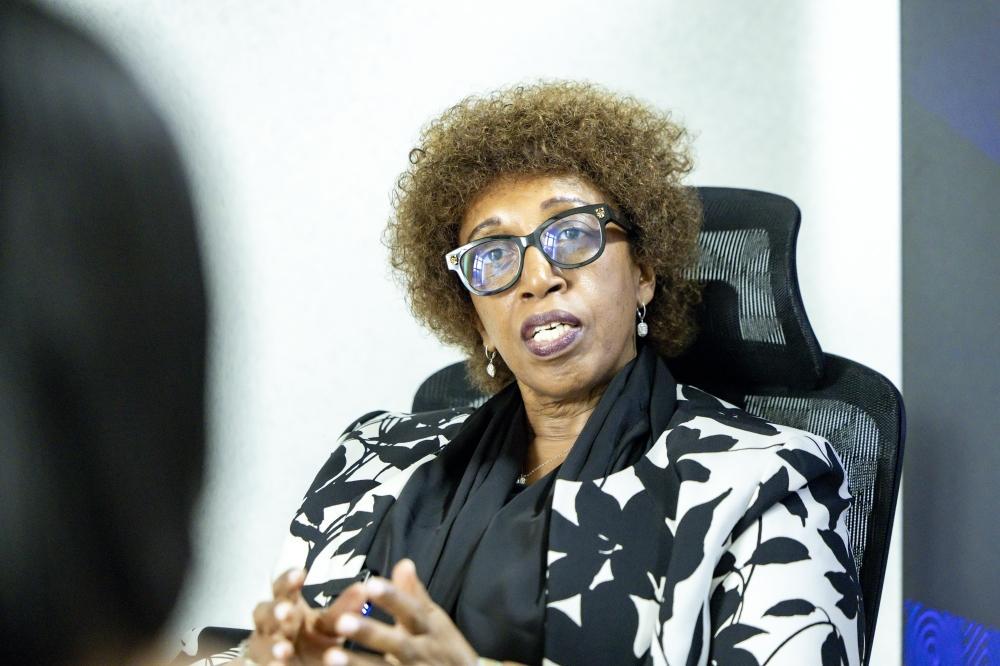Africa-Press – Rwanda. Rwanda will host the inaugural International Security Conference on Africa (ISCA), a platform that seeks to drive in-depth discussions on Africa’s security challenges and to foster sustainable solutions.
Taking place from May 19 to 20, the conference comes at a time when Africa continues to face complex, transnational security challenges, including terrorism, political instability, cyber threats, and organized crime, which undermine peace, hinder economic growth, and threaten regional stability.
In an interview with The New Times, Clotilde Mbaraga Gasarabwe, the Chairperson of ISCA, shed light on the significance of the conference amidst the current security dynamics on the continent and across the globe.
The former United Nations Assistant Secretary-General and Special Representative to Mali has experience that spans three decades in international development, security, and humanitarian assistance.
Below are excerpts.
Could you briefly tell us more about ISCA and how it seeks to contribute to addressing Africa’s pressing security challenges?
ISCA is an international non-governmental organization, based in Kigali, that seeks to cover all dimensions of security.
This is an annual forum that will bring together stakeholders in different capacities, including policymakers, security personnel, government officials, private security companies, think tanks, and civil society from both the continental and international levels to discuss security challenges and opportunities in Africa.
Africa is evolving in a way of looking at its own solutions to the problems in a practical way, and ISCA seeks to advance that.
What are the priority issues on the agenda and why are they relevant to the current security landscape in Africa?
This conference is timely. Today, we are facing so many security problems in Africa and beyond. There are a lot of threats regionally, continentally, and internationally.
There are internal conflicts and instabilities, cross-border threats, terrorism, and human trafficking, among others. In the world of today, there is so much focus on the wars in Ukraine-Russia, Israel-Gaza, but who talks about all the conflicts in Sudan, DR Congo, Central African Republic, and some countries in the Sahel
We want to look at the root causes of conflicts in Africa and look beyond those rivalries because sometimes there is external influence attracted to the natural resources on the continent. We are going to interact, not only as Africans but also as international participants.
We will also share perspectives on peacekeeping missions. I have been involved and I will definitely talk about this, but it’s so costly, and is it effective? I don’t think a peacekeeping mission brings lasting peace, because nobody from outside will bring you peace and security, you have to first think of your contributions.
The discussions will be timely, involving how to leverage technology to stabilize our countries, look at diplomatic ways of addressing issues as a prevention mechanism, dialogue, and negotiation, among others.
How is ISCA prepared to promote strategies that integrate economic development with security initiatives to address root causes of instability, such as poverty and unemployment in Africa?
When we talk about peace, we’re not talking about peace as something which you just find over there, but it’s how the society lives together, and how you can combine the matters of security, development, and peace.
As a resource-rich continent, the development tackles how we exploit our resources, who is exploiting our resources, and how the population is benefiting from them. That’s where good governance comes in with that part of policymaking and implementation.
That’s on a national level, but if you go beyond that, at a regional level, it’s country-to-country interactions. This conference will look at those items and definitely, do a lot of advocacy among our policymakers to make it happen.
We cannot pretend that we are the first ones to think about peace and security, there are many initiatives on the continent, but we do believe that this will contribute significantly and create partnerships that drive the influence of the African agenda.
Clotilde Mbaraga Gasarabwe, the Chairperson of the International Security Conference on Africa (ISCA). File
From your experience, where do you find the role of women and youth in shaping global security frameworks?
In my previous role as UN Assistant Secretary-General for the Department of Safety and Security, we faced a global war, and I do remember going to the Balkans.
We had the Genocide against the Tutsi in 1994, and we had also this challenging situation in the Balkans, and when I was in Croatia, I met some women who started accusing UN staff of abandoning them. Then I told them that I was Rwandan and, even though I was in the UN, we had the Genocide against the Tutsi. When they heard about that, they just came and embraced me.
Those women were advocating very much for peace and security, they were working on peacebuilding and organizing a community among themselves, and it just reminded me of what happened in Rwanda, and how the community formed internal initiatives like the Gacaca courts to address issues.
If you don’t involve the population, the communities, especially women who are central in teaching the children basic things about peace, you are building something that is not going to be sustainable. It’s not always about the military, it’s also about these issues that the community can build, and women play a key role in that.
Additionally, it is how we intentionally allow women to shape the security agenda and implementation, for instance, by deploying an all-women contingent in peacekeeping missions in areas of instability to provide safety and security to communities where women are threatened during and post-war conflict situations.
We make sure that when we talk about policymaking, peace, security, and development, we involve women.
This is an international conference. Why choose Rwanda as the host?
As President Paul Kagame always says, we are not small. Rwanda is small in size, but it’s big in thinking. We went through a lot, but we have the knowledge, a vision, good governance, and more to bring to the table.
The country that has faced years of instability, marginalization, and went through a genocide is now a conference destination because of security and stability, and economic growth. The participants will get a chance to move around, visit the memorial to understand the history not from hearsay but with facts, and then judge for themselves.
Any parting message?
We need to find solutions in a practical way, not only talking about it. It is about how we implement this and how we can have lasting peace, not the situation of having peace today and tomorrow have another crisis, and then you bring in the peacekeeping mission.
It’s my hope that African leaders can also embrace that vision of good governance, and then combine it with peace and security.
For More News And Analysis About Rwanda Follow Africa-Press






